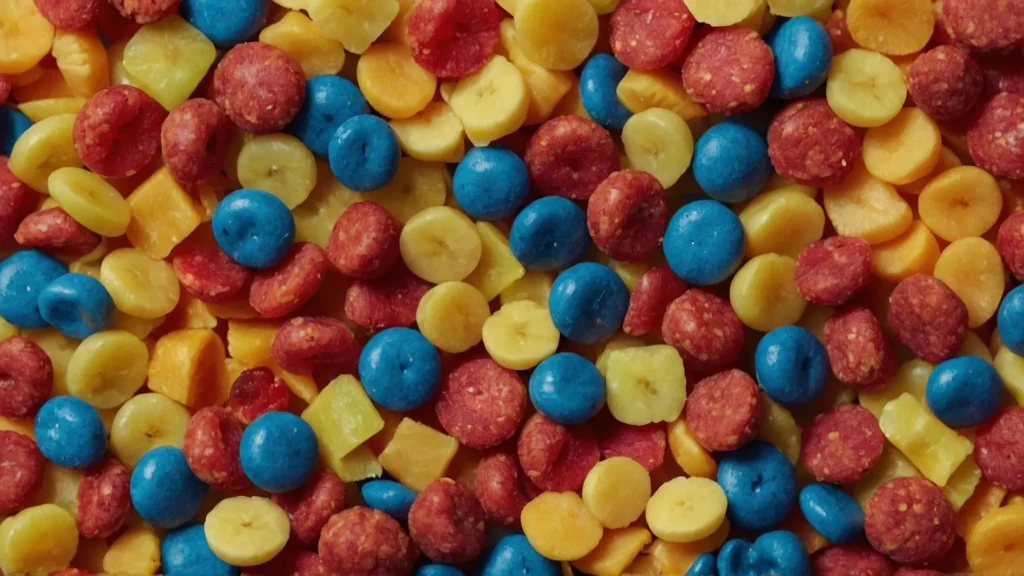Can dogs eat Fruity Pebbles?

In the vibrant world of pet care, the question of dietary diversity often pops up among dog owners eager to share their own culinary delights with their furry companions. “Can dogs eat Fruity Pebbles?” is one such query that might seem whimsical at first glance but raises important considerations about canine nutrition and health. Fruity Pebbles, a colorful and sweet breakfast cereal, could appear as a tempting treat for your dog, given its appealing aroma and taste. However, before indulging your pet in this human food, it’s crucial to understand the implications and how it fits into a dog’s diet. This article delves into the nutritional aspects of Fruity Pebbles, weighing the benefits and drawbacks, and explores alternative safe options for treating your dog.
Is Pebbles Good for Dogs?
When pondering the question, “Can dogs eat Fruity Pebbles?”, the immediate concern is whether this food could be beneficial for them. Fruity Pebbles, like many human cereals, is designed with human nutritional needs in mind, including flavors and ingredients that may not align with canine dietary requirements. While the occasional Fruity Pebble might not cause immediate harm, the cereal’s composition—high in sugar and artificial colors—offers little to no nutritional benefits for dogs.
Dogs require a balanced diet rich in proteins, fats, and carbohydrates, along with essential vitamins and minerals to support their health and energy levels. However, Fruity Pebbles lack the necessary protein content and contain a disproportionate amount of carbohydrates and sugars that can lead to weight gain and other health issues in dogs if consumed regularly. Additionally, the artificial flavors and colors added to make the cereal appealing to humans could potentially lead to allergic reactions or sensitivities in some dogs.
Is Pebbles Bad for Dogs?
Exploring the flip side of the query “Can dogs eat Fruity Pebbles?” reveals significant concerns. The primary ingredients of Fruity Pebbles, which include refined grains, a high sugar content, and artificial additives, pose several risks to canine health. Regular consumption of such high-sugar foods can lead to obesity, dental problems, and even diabetes in dogs. These conditions are not only detrimental to a dog’s quality of life but can also lead to costly veterinary bills and potentially, a shortened lifespan.

Moreover, the artificial colors and flavorings common in many processed foods, including Fruity Pebbles, can cause digestive upset in dogs, leading to symptoms like vomiting, diarrhea, and loss of appetite. Dogs with sensitive stomachs or food allergies are particularly at risk. It’s also worth noting that the lack of nutritional value in Fruity Pebbles means that they could displace more nutritious food options, leading to nutritional deficiencies over time if given as a frequent treat.
Are Other Foods Safe For Dogs?
Given the potential issues associated with Fruity Pebbles, dog owners might wonder about safer treat options. Many whole, unprocessed foods can serve as healthy treats for dogs. For instance, fruits like apples (without seeds), blueberries, and bananas can be excellent low-calorie, nutritious snacks in moderation. Similarly, vegetables such as carrots, green beans, and pumpkin offer dietary fiber and vitamins without the high sugar content of Fruity Pebbles.
When introducing new foods to your dog’s diet, it’s crucial to do so gradually and in small quantities to monitor for any adverse reactions. Additionally, always consult with a veterinarian before making significant changes to your dog’s diet, especially if your pet has pre-existing health conditions or dietary restrictions. Remember, treats should not make up more than 10% of a dog’s daily caloric intake to maintain a balanced diet.
Final Thoughts
To circle back to the initial inquiry, “Can dogs eat Fruity Pebbles?”, the consensus is that while an occasional pebble might not be harmful, Fruity Pebbles should not be a regular part of a dog’s diet. The high sugar content, lack of nutritional value, and presence of artificial additives make it an unsuitable treat for pets. As responsible dog owners, it’s our duty to provide our furry friends with foods that not only satisfy their taste buds but also contribute to their overall health and well-being.
Instead of reaching for the cereal box, opt for healthier, dog-friendly alternatives that offer nutritional benefits without the risks associated with processed human foods. By doing so, you ensure that your dog enjoys a varied and balanced diet, paving the way for a happy, healthy life together. Remember, when it comes to feeding your dog, it’s always better to err on the side of caution and stick with foods known to be safe and beneficial for their health.










